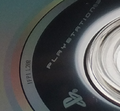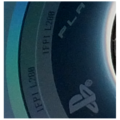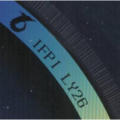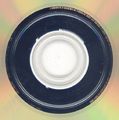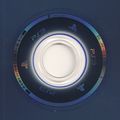Disc Identification/Serialization Data: Difference between revisions
mNo edit summary |
mNo edit summary |
||
| Line 3: | Line 3: | ||
== Source Identification Code == | == Source Identification Code == | ||
The '''Source Identification Code''' (SID-Code) can be found on almost all pressed optical discs worldwide since 1994, originally planned as a piracy safeguard, but it's also used for acceptance sampling. It contains two codes, a ''Mould Code'' and a ''Mastering Code''. Each code consists the digits "IFPI" (named by the '''I'''nternational '''F'''ederation of the '''P'''honographic '''I'''ndustry) followed by a four or (less often) five digit code. These two codes are located in the inner ring from any optical disc (outside the data section) and can be used to trace the location from a manufacturing or mastering plant, where the disc got pressed. | The '''Source Identification Code''' (SID-Code) can be found on almost all pressed optical discs worldwide since 1994, originally planned as a piracy safeguard, but it's also used for acceptance sampling. It contains two codes, a ''Mould Code'' and a ''Mastering Code''. Each code consists the digits "IFPI" (named by the '''I'''nternational '''F'''ederation of the '''P'''honographic '''I'''ndustry) followed by a four or (less often) five digit code. These two codes are located in the inner ring from any optical disc (outside the data section) and can be used to trace the location from a manufacturing or mastering plant, where the disc got pressed. | ||
=== Gallery === | === Gallery === | ||
Revision as of 22:54, 10 February 2014
The Identification & Serialisation Data from a PlayStation 4 Game Title contains several Information, which you can find not only on any Game Disc pressed for the PlayStation 4, but also similar for any PlayStation 3 and/or any other Console-based Disc Game, and other Media pressed on CD, DVD and Blu-ray.
Source Identification Code
The Source Identification Code (SID-Code) can be found on almost all pressed optical discs worldwide since 1994, originally planned as a piracy safeguard, but it's also used for acceptance sampling. It contains two codes, a Mould Code and a Mastering Code. Each code consists the digits "IFPI" (named by the International Federation of the Phonographic Industry) followed by a four or (less often) five digit code. These two codes are located in the inner ring from any optical disc (outside the data section) and can be used to trace the location from a manufacturing or mastering plant, where the disc got pressed.
Gallery
See also
Burst Cutting Area
The (Narrow) Burst Cutting Area ((N)BCA) can be used for adding further Information such as serial numbers or any other Information about the manufacturing process etc. The BCA-Code is written using a Nd:YAG laser and can be also used as a security measure to avoid illegal copies from a original pressed disc (as used on Game Discs both for the Nintendo GameCube & the Nintendo Wii). Therefore it's impossible to reproduce/copy the BCA with a standard optical disc drive running on a PC/Laptop.
- Location: inner ring, inside data section
- Radius: 1.2 mm (zone between 22.3 ±0.4 mm to 23.5 mm ±0.5 mm (single-layer), 21.0 ±0.4 mm to 22.2 mm ±0.5 mm (dual-layer))
- Data size: 12 bytes (minimum) to 188 bytes (maximum) (in steps of 16 bytes)
Sometimes blank recordable & rewritable discs (such as DVD-R/RW/RAM) also contains a BCA-Code, while Information about the CPRM and other DRM-policies were stored.
A Pre-recorded Media Serial Number (PMSN), located inside the BCA, can be stored on a Blu-ray Disc (but extremely unlikely on PS3/PS4 Game Discs because this is a part from the AACS copy protection).
PIC Zone
This (pre-recorded) PIC Zone, which is included within the BCA (Data size: 0x73 bytes), contains general Information about the disc that includes, but is not restricted to:
- Physical media class and version,
- Physical address of the start of the Data Zone
- Physical address of the start of the outer Zone (if this is a single-layer media, this is the lead-out)
- Number of layers
- Recording Density
- Write power Information
Gallery
See also
- Standard ECMA-267 - 3rd Edition - April 2001
- Physical Format Specifications for BD-ROM White Paper - 6th Edition - October, 2010
- Advanced Access Content System (AACS): Blu-ray Disc Pre-recorded Book
Angular Marks
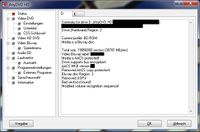
Angular Marks are also a security measure to avoid piracy. It makes the difference that these Marks were located in the data area of a disc (outside the BCA). It works similar to the old Bad Sector copy protection, were the CD-ROM got pressed with zero-filled Physical Sector Numbers, which were unreadable for very old outdated optical disc drives without a RAW-writing function. Instead, the sectors are readable (error correction will fix the angular marks), but a special feature of the DVD controller allows recovering the bit-exact position and size of the laser mark. The result is then stored signed in the BCA, so that the reader can validate it. Since the laser marks are written after producing the discs, the marks cannot be as accurately as required to pass a given BCA. This method is used on the Nintendo Gamecube, for example. This can be circumvented by placing strings of zeros in the actual bitstream, which - to the reader - look identical to an angular laser mark.
It is known[1] that Sony (Pictures Home Entertainment) use these Marks for their retail Blu-ray Movies to avoid illegal copies (which is easy to bypass), but there are no Information about the applicability on PS3/PS4 Game Discs pressed on BD-ROM.
Gallery
See also
ROM Mark
Notes
It is unknown if any PS3/PS4 Game Discs contains a ROM Mark because these Marks were only in use when there were several Mastering plants who got the order to press identical DVD's and/or Blu-ray's (for example when one plant in Portugal and another one in Finland got the orders to press the same Blu-ray Movie with identical Languages and Subtitles for releasing in several European markets. Therefore it works like a copy protection between all Mastering plants and those are able to verify if there were other (unlicensed) Mastering plants who reproduces a DVD and/or Blu-ray without permission (like on Third World markets with illegal copies in China, for example). But it seems that there is only one Mastering plant for each Region who owns the License to press PS4 Game Discs. As like, it would be redundant that PS4 Game Discs contains a ROM Mark.
So the ROM Mark can be also used as a security measure against piracy, which works together with AACS and already in use with several pressed Blu-ray movies. Of course it would be possible that the ROM Mark communicates with any other file(s) on a PS3/PS4 Game Disc, but with which one (EBOOT.BIN/INSTALL.PKG)? Therefore the following can be thought of as a general Information.
Information
ROM Mark or BD-ROM Mark is a serialization technology designed to make it more difficult for replication plants to do unlogged over-runs (being sold out the back door, without the copyright holder's knowledge) on a pressing.
Only licensed BD-ROM manufacturers have access to the equipment that can make these unique ROM Marks (physical-layer to store key cryptographic secrets).
Although every machine used to laser-cut a master disc is theoretically the same, the motor that spins the blank disc and moves the laser along a spiral track varies slightly in speed and precision. So if a digital marker is put in the middle of a recording, its physical position on the master disc - and every disc then pressed - will be a unique fingerprint of the cutting machine.
- Location: ?
- Length: ?
- Sample: ?
Patents and references
- http://www.google.com/#q=rom+mark+patent
- Blu-ray and HD DVD Content Protection
- Blu-ray Disc Marking System Explained
- Blu-Ray Disc Copy Protection - Whitepaper October 2006
Trivia
If you got horny about those pictures of the bottom side from a PS4 Game Disc:
- CUSA-00002 (Killzone: Shadow Fall): JPG @ 4843x4915px - TIF @ 11758x11933px
- CUSA-00128 (FIFA 14):: JPG @ 3686x3633px - TIF @ 12166x11990px
References
- ↑ see http://psdevwiki.com/ps3/ - AACS specifications and BD patents
Generic
- Postscribed ID
- http://www.blu-raydisc.com/assets/downloadablefile/bd-romwhitepaper20070308-15270.pdf (including page 40 - SID, page 41 - BCA, page 45 - PIC Zone)
- AACS specifications
- Patent 07278031 - Secure distribution of portable game software & a sketch from the given Patent
- Thomson Patent:
- Optical disc with pre-recorded and recordable regions (A proposed alternative for CBA: disabled at factory, enabled at a point of sale)
| |||||||||||||||||||||||||||||||||||||

